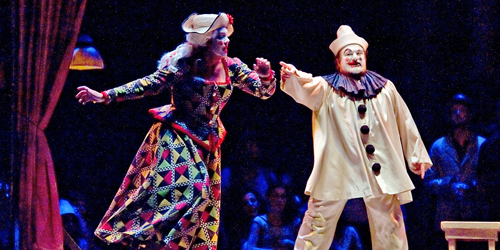By Michael H. Margolin

In 1904, Enrico Caruso's recording of "Vesti la giubba," the aria from the conclusion of Act One of Ruggero Leoncavallo's 1892 opera " I Pagliacci," became the first million-selling record in history.
It is a justly famous aria, dramatizing the irony of men who love too well – Canio, the "clown," like Othello, is tortured by jealousy and it ends badly, while Tonio, who reveals his wife Nedda's inconstancy, gets off, as does Iago. But while Othello's jealousy is forefront, Canio is one of the clowns, men who betray their humanity. And so the title of the opera, "The Clowns," is more Everyman than hero.
That is where the Romantic movement in opera shades into Verismo opera, that style in which reflections on the reality of the lives of rather ordinary people – meanness, pettiness, revenge without greatness or ideals – creates a much-loved genre in opera.
Traditionally, "I Pagliacci" is paired with "Cavalleria Rusticana," another verismo piece in which machismo leads to a tawdry finale. This time out Michigan Opera Theatre has chosen Bernard Uzan's production, enhanced with a 10-minute pantomime at the beginning of Act Two, as a stand-alone. Uzan has supported his vision with two clowns in the commedia dell'arte style, one in black and one in white, comedy and tragedy, who act as commentators on the action, in mime.
Uzan takes a line of Canio's to the effect that he discovered Nedda (a poor, young girl), took her under his wing and made her into a performer in his traveling company, roaming the environs of southern Italy, here updated to what appears to be the 1920s (it debuted in 1892). The pantomime, set to Leoncallo's music from "Zaza," shows a stage upon which Nedda's development, portrayed by three progressively older actresses, is nurtured by Canio, Pygmalion to her Galatea. The accompanying music is very much like a band of the era. This morphs smoothly into Act Two, as the stage moves forward to become the portal on which the final drama is enacted.
Cleverly rethought, it stands alone as a work of drama and music – rich, urgent, demanding of singers.
Antonello Polombi returns to MOT (2010's smooth, powerful Cavarodossi in "Tosca") to play the consummate clown. The role is written with high tessitura, and Polombi delivers golden, sustained notes tapering many into beautiful near-pianissimo, and, importantly, imbues the character with real humanity. His aria "Vesti…" which means "put on the costume," tells all we need to know about this man and his ego, his devotion to his art while bristling with regret and sorrow. A great performance.
There are two other major roles and two important supporting roles. As Tonio, who forces the central action of the plot, Gordon Hawkins opens the opera with his plangent baritone, describing actors who have the same feelings as all people, and ends the opera with that magnificent line, "The comedy is finished." Hawkins last appeared at MOT in 2006's "Porgy and Bess."
As Nedda, soprano Jill Gardner appears here for the first time. Initially, ironically reflecting her line about the "shrill screeching" of birds, she warmed up to provide forceful, dynamic singing, and in Act Two, a beautifully delineated impersonation of Colombina in the play within the play.
In that play, her Pagliaccio was transformed from second banana, the actor Beppe, into a facile, romantic tenor, whose balcony serenade revealed a light, attractive tenor – sung by Phillipe Pierce, new to MOT. As Silvio, Nedda's loverboy, Luis Ledesma – who sang a solid, affecting Germont in MOT's 2008 "La Traviata" – is good-looking with a suave baritone.
In the pit, Steven Mercurio returned for his 17th podium assignment with MOT. He brought out the great intensity of the score, and the musicians of the MOT Orchestra gave him what he asked for – though the low strings were not as strong as they needed to be. Again, Suzanne Mallare Acton, the chorus master, encouraged the fine MOT chorus to produce gorgeous singing.
For the most part, Cynthia Savage's costume design hit the vernacular nail on the head (though plaid walking shorts for 1920 Italy looked absurd). Claude Girard's set design was the real thing, and Donald Thomas' lighting design was exquisite.
MOT, even in the toughest of financial times, continues to produce singular opera, beautifully cast, a dynamic orchestra and one of the best choruses one could ask for – at the top of Michigan's cultural pyramid.
REVIEW:
'I Pagliacci'
Michigan Opera Theatre at Detroit Opera House, 1526 Broadway St., Detroit. May 16, 18-20. $29-$121. 120 minutes. 313-237-SING. http://www.michiganopera.org










